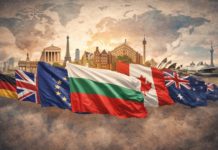By Rumyana Vakarelska
Political stability is a currency in high demand in Bulgaria, as a week after the general elections for the 43rd National Assembly, new political and societal divisions have occurred, following questionable Central Electoral Commissions (CIK) vote distribution.
Instead of looking forward towards a stable government and allowing Bulgarians at home and Bulgarians abroad go about their usual business, demonstrators in two regions, Kustendil and Yambol, where GERB was leading, were asking why they are getting less than expected seats in Parliament, when the latter went were counted as BSP seats.
Instead to focusing on building a successful coalition government, the political focus of all parties involved now swung towards asking the basic questions, where did the votes go, how could have these votes distribution happen on the first place and what role does the CIK play in all this.
This question matters as the 2,5 million Bulgarians abroad do not have an electoral district, so the distributions of our votes is currently unknown. CIK had already some big questions to answer on that, as well as why voters abroad did have the right to cast their choice for preferences of people. This additional issue of vote distribution was not entirely expected given the above gaps, as well as the organisation’s edgy performance abroad for at least two years in row.
As the Economist magazine has helpfully reminded in its issue of October 11, we are in the process of choosing the fifth government in 18 months, whereby the current and the previous caretaker governments last spring were appointed by the Bulgarian President, Rossen Plevneliev, not by the Bulgarian voters. He has to form a government until 5 November, but earlier calls that a low turnout will lead to a second round of elections this week seem more probable than last.
As expected, BSP, the party which holds the second biggest number of votes with 15,4 pc, has this morning turned down participation in the government, so the leading party talks in the face of GERB with DPS, are to follow, reaching currently the most probable scenario.
Namely, until yesterday, GERB’s coalition with the Reformist Block and possibly the Patriotic Front looked like possible, but it seems that while GERB is leading negotiations with the above incumbent parties, CIK’s distribution of votes may make all these negotiations obsolete.
In addition, the Patriotic Front has been saying that in the future they want only Bulgarians at home and not those abroad to have the right to vote, which in addition contravenes the least with EU regulations for those living in the EU.
Currently, there is not sufficient ground to think that a second general elections vote for the 43rd National Assembly would run given all the above issue, but the demonstrators from the above two regions are also calling for a referendum on the Electoral Law in Bulgaria and they have not been alone. If this happens, Bulgarians abroad have to finally get their own electoral district and thus finally become more visible as voters, especially to the Bulgarian establishment, as the interests of this big section of the Bulgarian population, remain for a number of reasons insufficiently represented, especially back in Bulgaria.
As mentioned in the previous article on this page, ‘Calling all voters’, (issue 40) only 77, 000 Bulgarians abroad have cast their vote, with Bulgarian voters in the UK being most active in EU.
These very same voters educate their children in the UK and some of the best in the computer science, management and educational technologies among others have this year went back home. These voters continue to represent the single Foreign Direct Investor in Bulgaria, with the current IMF economic growth forecast at 1, 4 pc, which although lower, remains comparable with a number of EU countries.
According to IMF, UK’s growth has been being estimated at 3,2 pc in 2014 and 2,7 pc in 2015, remaining the fastest growing economy in G7 ahead of US, Germany and France.
Bulgarians abroad remain the most viable link to badly needed new FDI and skills to Bulgaria, so their voter group cannot be endlessly ignored at macro-economic and political level, either.
Meanwhile, long-standing Bulgarian expatriates have called for some time for better, more transparent and tailored to their needs administrative and utility payment services in their original home country, so they can continue invest. Due to the lack of these services, some were pushed to sell long-standing family homes and thus severe professional and personal links with Bulgaria. New regulation on home owners’ rights and responsibilities among other important aspects of Bulgarian legislation is often introduced without any information campaigns for those maintaining property and supporting families in Bulgaria from abroad.
One does not need to look too far for how this is done, as Britain takes a good care for its citizens abroad. Those Bulgarians living in the UK, who have got a dual British citizenship, may have already found that they can get help in Bulgaria from the British government through the British Embassy offices in Bulgaria if needed, which is remarkable, given that this week two UKIP MPs have finally entered the British Parliament.
This change in the seats of the UK Parliament is not favourable for Bulgarians and other EU citizens in the UK, but for now can be viewed as a warning that Bulgarians in the UK may need a better and stronger representation as a group by their birth countries’ governments.
On the positive side, Jonathan Hill, the UK Designate EU Commissioner for Financial services has been approved by the European Parliament as the British EU Commissioner, so Bulgarians with dual citizenship in the UK got at EU level two strong figures to expect high level representation from.
Firstly, in the face of Kristalina Georgieva, the EU’s Bulgarian high-flyer, who is now the Vice President for the EU’s Budget and Human Resources, and secondly, from UK’s Jonathan Hill, while their sectors of responsibility are not obligatory disconnected.
Once again, Bulgarians have to wait for a good news such as getting a new stable government sooner than later, and with time, a new electoral law. Meanwhile, they will have to double check once again their personal address books with friends to help with all issues that matter to them on the ground in Bulgaria.
Copyright Rumyana Vakarelska
‘Budilnik’ s newspaper new English Language Page contains timely and timeless original journalistic content in print and online on key developments in Bulgaria and Britain and on UK’s ex-pat life, aiming to build a higher and well-informed mutual awareness of the two countries and the viable prospects ahead of both. Interested sponsors for the English language page, please contact Rumyana Vakarelska, Team New Europe, an editorial and public affairs consultancy in London by email: rumy.vakarelska@gmail.com















